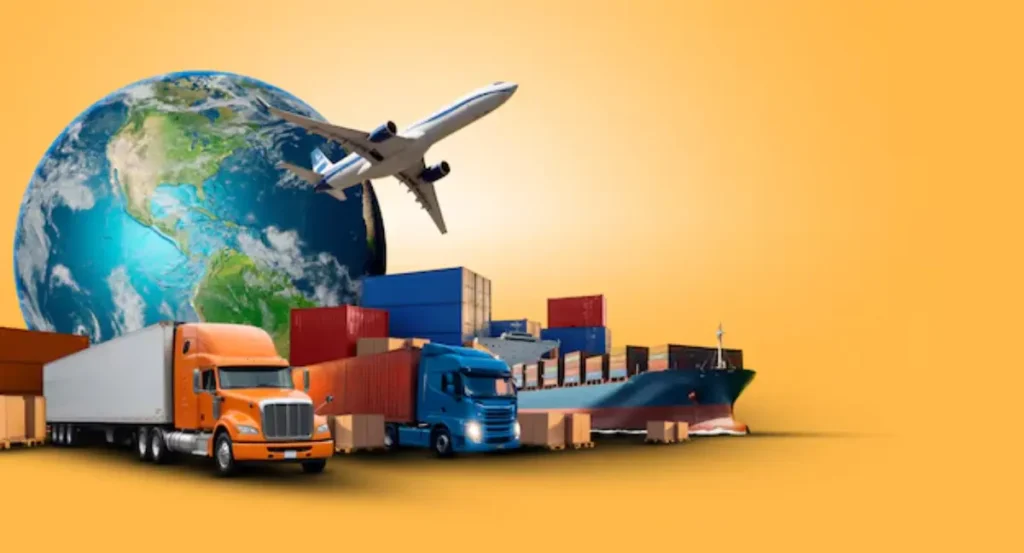In today’s world, businesses are no longer limited to their local markets. A clothing brand in Pakistan can sell to customers in the USA, while a car manufacturer in Germany might import parts from Japan. This is possible because of something called global logistics.
But what exactly does global logistics mean, and why is it so important for businesses of all sizes? Let’s break it down step by step, in a simple and professional way, so even beginners can clearly understand its role in international trade.
What Is Global Logistics?
Global logistics is the process of planning, managing, and controlling how goods move across countries and continents. It involves everything from:
Transportation (by air, sea, rail, and road)
Customs clearance (documents and taxes)
Warehousing and storage
Inventory and supply chain management
Final delivery to the customer
In short, global logistics makes sure that products get from one part of the world to another—safely, quickly, and cost-effectively.
Why Is Global Logistics Important for Businesses?
Businesses today are part of a global economy. Whether you are a small online store or a multinational company, logistics plays a central role in how you serve your customers. Here are the key reasons why it matters:
1. Access to International Markets
Without global logistics, a business would only sell within its home country. But with proper logistics services, even small businesses can ship to customers worldwide. For example, a bakery in France can export chocolates to Saudi Arabia.
2. Faster Deliveries
Customers expect quick shipping. With efficient logistics, companies can reduce delays, speed up delivery, and build stronger customer trust.
3. Cost Savings
Global logistics providers know how to combine shipments, negotiate with carriers, and use the best transport routes. This helps businesses cut down shipping costs and still provide excellent service.
4. Smooth Customs Handling
Paperwork and taxes can be confusing. Logistics experts make sure all import and export rules are followed, so shipments don’t get stuck at borders.
5. Better Supply Chain Management
Global logistics is more than just moving goods. It helps businesses manage inventory, reduce waste, and keep products available when customers need them.
6. Competitive Advantage
Companies that master logistics can offer better prices, faster delivery, and wider product choices—making them more attractive than competitors.
Components of Global Logistics
To understand how global logistics works, let’s look at its main parts:
1. Transportation
The backbone of global logistics is transportation. Businesses use different modes:
Air freight for urgent and valuable goods
Sea freight for large and heavy shipments
Rail freight for inland transport of bulk items
Road freight for local and door-to-door deliveries
2. Warehousing
Goods don’t always move directly from factory to customer. Warehouses store products until they are ready for distribution. Modern warehouses also provide services like packaging and labeling.
3. Customs Clearance
Every country has rules for imports and exports. Logistics providers manage all the paperwork, duties, and taxes so that goods pass borders smoothly.
4. Distribution
Once goods arrive in the destination country, they must be delivered to wholesalers, retailers, or directly to customers. This last step ensures the product completes its journey.
5. Technology and Tracking
Modern logistics uses digital tools like GPS and online tracking systems. This gives businesses and customers real-time updates on where their shipments are.
How Global Logistics Supports Different Businesses?
Global logistics isn’t just for large corporations. It benefits all types of businesses:
Small businesses: An online store selling handmade crafts can ship globally through logistics partners.
Medium enterprises: A furniture manufacturer can expand into international markets with affordable sea freight solutions.
Large corporations: Automobile, electronics, and pharmaceutical companies rely on logistics to run global supply chains efficiently.
Real-World Example
Think of a smartphone company. The screen might come from South Korea, the battery from China, the microchip from Taiwan, and the final assembly in India. Then, the finished phone is sold worldwide.
Without global logistics, coordinating these steps would be impossible. Logistics ensures that each part arrives on time, production continues smoothly, and customers receive their phones without delays.
The Challenges of Global Logistics
While logistics brings many benefits, it also comes with challenges businesses must manage:
Delays – Weather, strikes, or port congestion can slow shipments.
Costs – Rising fuel prices and global demand affect shipping expenses.
Regulations – Different countries have different laws, making compliance difficult.
Risk Management – Goods can be damaged or lost in transit without proper security.
This is why working with a trusted logistics provider is so important—they help businesses overcome these challenges.
The Future of Global Logistics
With the growth of e-commerce and technology, logistics is becoming even more important. Businesses will need to focus on:
Sustainability: Using eco-friendly shipping methods.
Digital tools: Real-time tracking, AI planning, and automation.
Faster delivery models: Meeting the rising expectations of global customers.
Companies that adapt to these changes will be more successful in global trade.
Final Thoughts
Global logistics is the bridge that connects businesses with the world. It makes trade possible, affordable, and reliable. From small online shops to international corporations, every business relies on logistics to grow and succeed.
For businesses, the message is simple: if you want to reach more customers, reduce costs, and stay competitive, you need strong global logistics support.
Looking for a trusted partner in global logistics?
Islo Logistics provides end-to-end international shipping solutions—air, sea, rail, and road freight—along with customs clearance and supply chain management. Partner with Islo Logistics today and take your business worldwide!
Frequently Asked Questions (FAQ)
Q1: What does global logistics mean in simple terms?
It means managing how goods move from one country to another through shipping, customs, warehousing, and delivery.
Q2: Is global logistics only for large companies?
No. Small and medium businesses can also benefit and reach international customers.
Q3: What is the cheapest way to ship internationally?
Sea freight is usually the most affordable for large and heavy shipments, while air freight is faster but more expensive.
Q4: Why is customs clearance important in logistics?
It ensures shipments follow all laws and regulations, preventing delays at borders.
Q5: How does technology improve global logistics?
It provides real-time tracking, faster communication, and more efficient planning.

